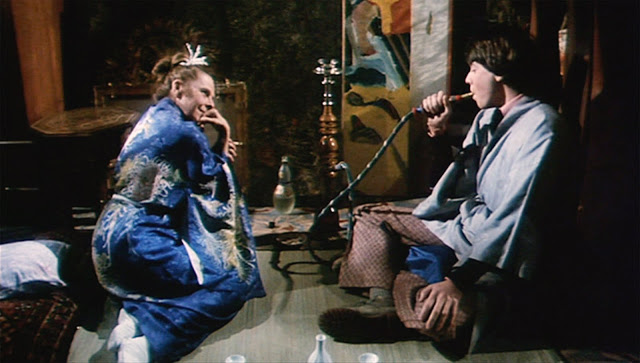
Who is to say what love is and what it should look like? And Hal Ashby’s vital Harold and Maude is a love story in the truest sense of the word. Encapsulating the spirit of the 60’s in essence at the turn of the decade, the film thrums along to the songs of Cat Stevens adding an intrinsic rhythm and levity akin to the rough poetry of Leonard Cohen’s soundtrack in McCabe and Mrs Miller of the same year. We dance along with it, but there is a universality to Harold and Maude, so often overlooked.
Harold (Bud Cort) is privileged and depressed.On the brink of manhood, materially he has it all. Emotionally – nothing. His mother is icy, narcissistic and conventional, embedded in the banality of wealth and the rituals of high society, seemingly lacking any maternal or let’s face it, human emotion whatsoever. Harold mocks her contemptuously with a series of increasingly theatrical suicide attempts, all delivered tonally with the surety of deadpan hilarity by Ashby. His increasing morbidity is assuaged by driving a hearse and attending funerals, which is where he meets Maude (Ruth Gordon), also a frequenter of random funerals, though for altogether different reasons; a lover of life in all its stages, she simply enjoys them. Maude latches onto him and bewildered, Harold goes along-at first. She’s a free spirit, irreverent to the laws of the land – she ‘borrows’ cars, smokes a Hookah and is a nude model; she’s also on the cusp of her 80th birthday. One thing’s for certain, Harold’s never met anyone like her and his life is irrevocably changed.She teaches Harold to ‘aim above morality’ as the path to enjoying a full life. The miracle of Maude is infectious and as she touches the heart of Harold with her warmth and tenderness, an unfolding intimacy ensues; he begins to bloom, his pallid complexion takes on an altogether new hue as gentle laughter breaks out across his severe, unloved face.
Why does Maude reach out? A tattooed number on her arm reveals the roughest rite of passage towards her now unquenchable joie de vivre. Perhaps sensing this mournful young man’s suffering, she feels drawn and wants to know more. The outcome though, is a compassionate stealing of him, from his toxic, deadening world, replanting him in richer soil – as she does with a dying sapling on a polluted city street, for no other reason than to let it thrive and grow. But with Harold it’s reciprocal. As their intimacy deepens, so Maude transforms also: We have the privilege of seeing her through Harold’s eyes; an ageless, incandescently beautiful woman whom Harold loves. Their tenderness, at times disarming, envelops them and us, rippling out, as all love does, permeating their humble surroundings. A reality no one else can see.
And as all great loves must end, when the time comes for them to part Harold clings, saying: “I love you. I Love you” Maude joyfully answers: “Oh Harold, that’s wonderful. Go and love some more”.